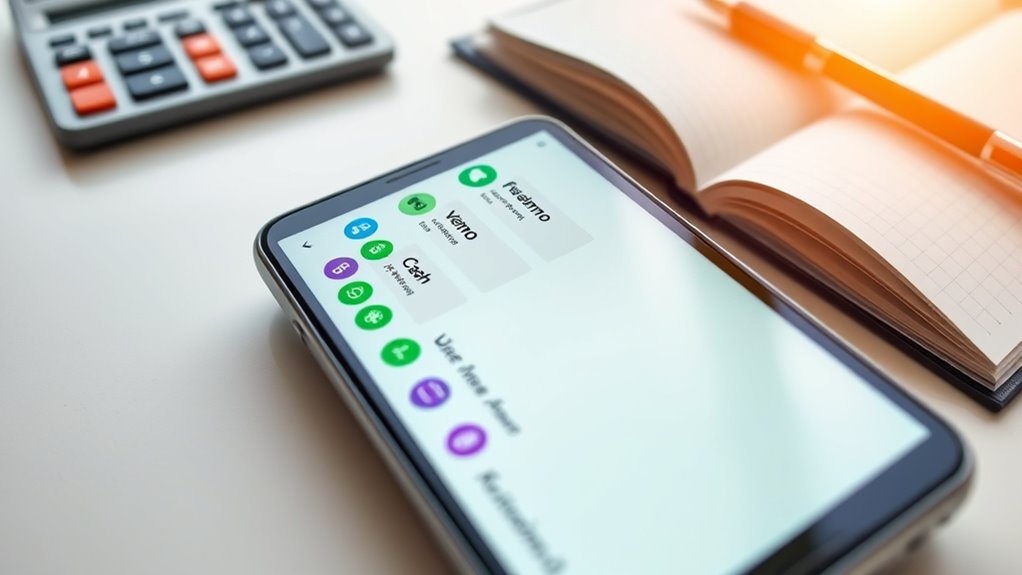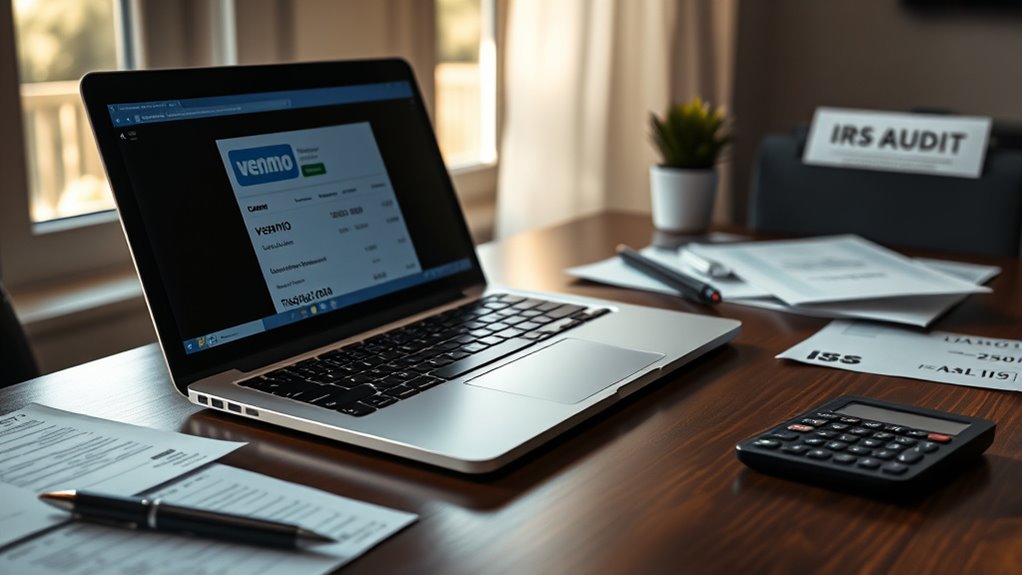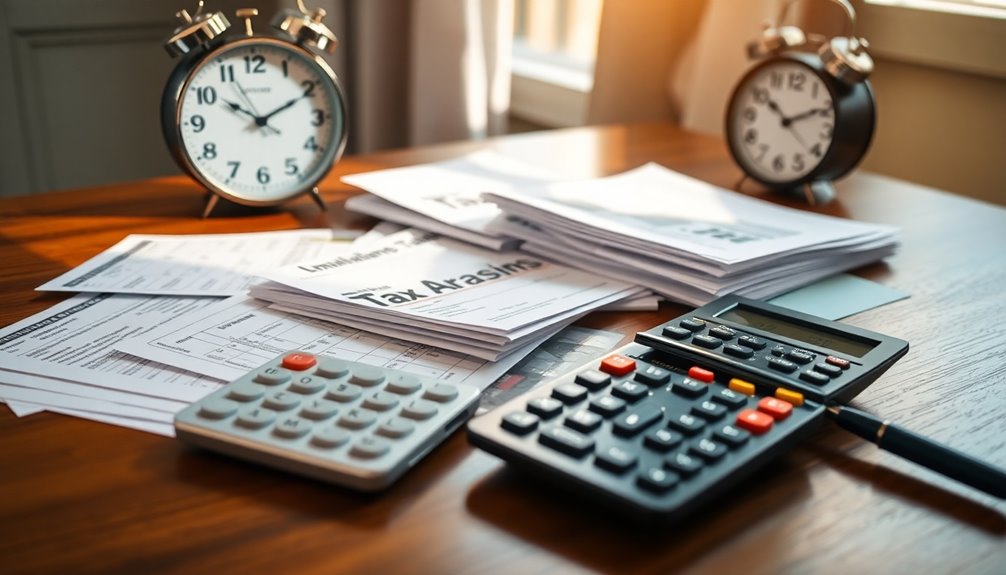If you use Venmo or Cash App for income, you need to stay aware of IRS rules that are constantly changing. Starting in 2024, the reporting threshold drops from $20,000 to just $5,000, with even lower limits set for 2025 and 2026. This means more small transactions like side gigs or casual sales get reported. Proper recordkeeping and understanding what qualifies as taxable income are essential—and if you keep going, you’ll discover how to stay compliant and avoid surprises.
Key Takeaways
- Income from sales or services via Venmo or Cash App must be reported if it exceeds IRS thresholds, regardless of 1099-K issuance.
- Starting in 2024, transactions over $5,000 are reportable without a minimum number of transactions.
- Personal gifts and reimbursements are generally non-taxable and don’t require IRS reporting.
- Keep detailed records and separate personal and business accounts to ensure accurate income reporting.
- Regularly reconcile platform statements with internal records to stay compliant and avoid tax surprises.
Understanding the New IRS Thresholds for Digital Payments

Have you noticed how the IRS is changing the way it tracks digital payments? The reporting thresholds for platforms like Venmo and Cash App have been lowered considerably. Initially, third-party settlement organizations (TPSOs) only reported transactions over $20,000 with more than 200 transactions annually. Now, in 2024, the threshold drops to $5,000 in aggregate payments, and it will further decrease to $2,500 in 2025. By 2026, it will be just $600, aligning with the original intent of capturing more digital economy activities. This means cryptocurrency exchanges and payment apps will report more transactions, including gift card transactions, which could be taxable if they relate to income. Staying aware of these thresholds helps you avoid surprises when tax season arrives. Additionally, understanding the new IRS thresholds is crucial for accurate reporting and compliance.
What Types of Income Must Be Reported From Payment Apps

You need to report income from sales of goods or services made through payment apps like Venmo or Cash App, especially if they exceed certain thresholds. Personal transactions between friends and family are generally not taxable and don’t have to be reported. However, any money earned from business activities or rentals must be documented and included on your taxes. Proper verification is essential to ensure only taxable income is reported, particularly when receiving a 1099-K, which can be affected by transaction types and the nature of payments received.
Business Income Recognition
Any income received through payment apps like Venmo and Cash App that relates to selling goods, providing services, or earning rental income must be reported as taxable business income. Proper income classification is essential to guarantee accurate tax reporting. If you receive payments for your side hustle, freelance work, or rental activities, these amounts are considered business income and should be included on your tax return. Keep in mind that claiming tax deductions for related expenses can reduce your taxable income, but all income must be accurately documented. Even if you don’t receive a Form 1099-K, you’re still responsible for reporting all business-related earnings. Proper income categorization helps avoid penalties and ensures compliance with IRS rules governing income recognition from payment apps. Accurate recordkeeping is crucial to substantiate your income and deductions in case of an audit.
Personal Transaction Exclusions
Payments made through apps like Venmo or Cash App for personal reasons—such as repaying a friend, splitting dinner bills, or giving personal gifts—are not taxable and don’t need to be reported to the IRS. Personal gifts, whether cash or transferred via payment apps, fall outside taxable income, as long as they are truly gifts and not payments for goods or services. Reimbursement rules also apply here; reimbursements for shared personal expenses are not reportable if they aren’t considered income. The IRS expects you to distinguish personal transactions from business-related payments to avoid misreporting. Since these personal transactions don’t trigger the issuance of a Form 1099-K, they remain outside the scope of taxable income, provided they meet the criteria for personal gifts and reimbursements. Additionally, understanding the Vetted – Mother Baby Kids guidelines can help you stay compliant when managing family-related transactions.
Recognizing Non-Taxable Transactions and Common Misclassifications

Understanding which transactions are non-taxable on Venmo and Cash App is essential to avoid unnecessary tax reporting. Gift transactions and reimbursements for shared expenses are classic examples of non-taxable transfers. Payments between friends and family for personal reasons, like splitting bills or rent, shouldn’t be tagged as “goods and services,” as this can cause misclassification and unintended tax consequences. Transfers such as refunds or loan repayments also aren’t taxable, nor do casual money transfers. Misclassifying personal payments as business income—by labeling them as “goods and services”—can lead to IRS reporting errors. To prevent confusion, keep personal and business transactions separate and accurately categorize reimbursements and gift payments. Proper recognition guarantees you avoid reporting errors and unnecessary tax liabilities. Accurate transaction categorization helps ensure that only taxable transactions are reported, reducing the risk of IRS issues. Recognizing non-taxable transfers is crucial for maintaining correct records and avoiding penalties.
How the 1099-K Form Affects Your Tax Filing Process

The 1099-K form plays a key role in your tax filing process by reporting the gross amount of payments you receive through Venmo, Cash App, and similar platforms. It increases IRS visibility but doesn’t automatically determine taxable income. You need to reconcile the reported amount with your actual income, subtracting non-taxable payments like reimbursements or gifts. Be aware that lower thresholds mean more recipients, especially freelancers, will receive 1099-Ks, which could impact your payment privacy. Transaction fees and refunds also affect your reported income, so tracking these details separately is essential. Additionally, understanding dog breeds can help clarify the diversity of animals involved in various activities, including service roles that some dogs perform.
Best Practices for Tracking Income and Expenses on Payment Platforms

To effectively track your income and expenses on payment platforms, it’s essential to use organized systems like spreadsheets, accounting software, or dedicated apps that record all inflows and outflows in real time. This helps maintain proper payment etiquette and protects user privacy by keeping clear records of each transaction’s purpose. Categorize income sources—such as freelance work or sales—and expenses, like supplies or fees, to simplify tax filing. Always add detailed notes describing each transaction to avoid misclassification and ensure clarity for IRS reporting. Regularly reconcile your records with platform statements to catch discrepancies early. Using separate accounts for personal and business transactions further safeguards user privacy and streamlines tracking, making tax compliance more straightforward and efficient. Maintaining consistent documentation can help you verify the accuracy of your reported income if questioned by tax authorities. Additionally, understanding the different cookie types and user consent options can help you manage data privacy and improve your financial tracking practices.
Preparing for Increased IRS Oversight and Ensuring Compliance

As IRS reporting thresholds drop, you need to keep accurate records of all your transactions and related expenses. This helps guarantee you’re prepared for receiving Form 1099-K and accurately reporting your income. Staying organized now can prevent mistakes and make tax filing smoother down the line. Platforms are required to issue 1099-K forms when thresholds are met, so proper recordkeeping ensures you can verify your income details against what the IRS receives. Maintaining detailed documentation of your Glycolic Acid benefits for skin and usage can also help substantiate any claims related to your income sources involving skincare sales or services.
Enhanced Reporting Thresholds
Have you noticed how IRS reporting requirements for Venmo, Cash App, and other payment platforms are shrinking? Starting in 2024, the threshold drops from $20,000 and 200 transactions to $5,000 with no minimum transactions, then further to $2,500 in 2025, and finally $600 in 2026. These changes mean more activity will be reported, affecting your fee structures and user privacy. To stay compliant, regularly review your transaction history and separate personal from business accounts. Here’s a quick overview:
| Year | Threshold | Transaction Count | Impact | Key Considerations |
|---|---|---|---|---|
| 2023 | $20,000 | 200 | Less reporting; casual users unaffected | Privacy maintained; fee structures stable |
| 2024 | $5,000 | No minimum | More small businesses report | Increased oversight; privacy concerns |
| 2025 | $2,500 | No minimum | Small sellers impacted | Prepare for more reporting |
| 2026 | $600 | No minimum | Nearly all activity reported | Maximize record-keeping |
Additionally, the lower thresholds mean that even small transactions could trigger IRS reporting, so it’s important to keep detailed records of your income and expenses to ensure proper tax compliance.
Accurate Transaction Tracking
With IRS reporting thresholds decreasing markedly in the coming years, maintaining accurate transaction tracking becomes essential. You need to implement effective real-time logs and leverage platform security features during user onboarding to guarantee proper record-keeping. Consider these steps:
- Use automated or manual tracking tools to log transaction details, including dates, parties, amounts, and purposes.
- Regularly reconcile 1099-K reports with your records to catch discrepancies early.
- Verify your account information during user onboarding to prevent reporting errors or delays. Additionally, staying updated on regulatory changes can help ensure ongoing compliance and avoid potential penalties.
- Enhancing your privacy policy by clearly explaining data collection practices can foster trust and ensure transparency with your users.
Documentation for Tax Filing
Preparing for increased IRS oversight requires diligent documentation of your Venmo and Cash App transactions. You need to keep detailed records of payment dates, amounts, payer details, and the purpose of each transaction to guarantee accurate tax reporting. This documentation supports your income claims and helps verify your user information, which is critical for payment security and avoiding backup withholding. Regularly download account statements and transaction histories, especially for non-reportable transactions that could impact your taxes. Separating personal and business payments through dedicated accounts simplifies record-keeping. Staying organized with these records not only prepares you for potential audits but also ensures compliance with evolving IRS thresholds. Maintaining comprehensive records is essential for verifying the accuracy of your reported income. Good documentation safeguards your income, secures your payments, and reinforces your user verification efforts. Additionally, understanding the reporting thresholds and staying informed about the latest IRS guidelines can prevent unexpected complications during tax season.
Frequently Asked Questions
How Do I Distinguish Between Personal and Business Transactions on Payment Apps?
To distinguish between personal and business transactions on payment apps, you should use a dedicated business account for sales or commercial activities. Personal transactions include gifts or reimbursements and are for peer-to-peer use. Avoid mixing these with business transactions, which involve selling goods or services. Properly categorizing transactions helps you stay compliant and prevents account issues; always use a business account for any income-generating activity to keep things clear.
What Records Should I Keep to Verify My Payment App Income?
You need to keep detailed records to verify your payment app income. Start by saving your transaction history, which shows dates, amounts, and payers. Also, retain relevant bank statements that match deposits from the app. Screenshots of payment confirmations and invoices are helpful. Organize these records by personal or business use, ensuring you have everything on hand to substantiate your income if needed for tax reporting or audits.
Are Reimbursements or Gifts Ever Considered Taxable Income?
Imagine receiving a surprise gift or reimbursement that feels like a small treasure chest. Usually, gift reporting and reimbursement taxation don’t turn these into taxable income—if they’re genuine gifts or reimbursements matching actual expenses. But if a gift is lavish or a reimbursement exceeds costs, it might become taxable. Always keep detailed records to prove reimbursements and understand that gifts, especially large ones, could require reporting to avoid tax surprises.
How Do I Report Income From Sales of Personal Items at a Profit?
When you have sales profit from personal items, you need to report it on your tax return. Keep records of your purchase and sale prices to calculate your gain accurately. If you sell personal items at a profit, include it on Schedule D for capital gains. Be sure to track all transactions and report any income exceeding IRS thresholds, even if payment apps don’t automatically send you a 1099-K.
What Penalties Exist for Failing to Report Income From Payment Apps?
Ignoring the need to report income can quietly lead to serious trouble. If you don’t report income from payment apps, the IRS might initiate a tax audit, increasing the risk of penalty fines. You could face accuracy-related penalties of up to 20%, failure-to-pay penalties, interest charges, and backup withholding. Staying compliant avoids these complications and keeps your financial reputation intact, ensuring you handle your tax responsibilities smoothly.
Conclusion
Think of your payment apps as a mirror reflecting your financial story. By understanding the rules and staying compliant, you guarantee that your story remains clear and true. Ignoring the IRS thresholds is like ignoring the lighthouse guiding your way—risking unseen storms. Stay diligent, track every transaction, and let transparency be your compass. When you navigate with awareness, you keep your financial ship steady, sailing smoothly through any tax season ahead.









